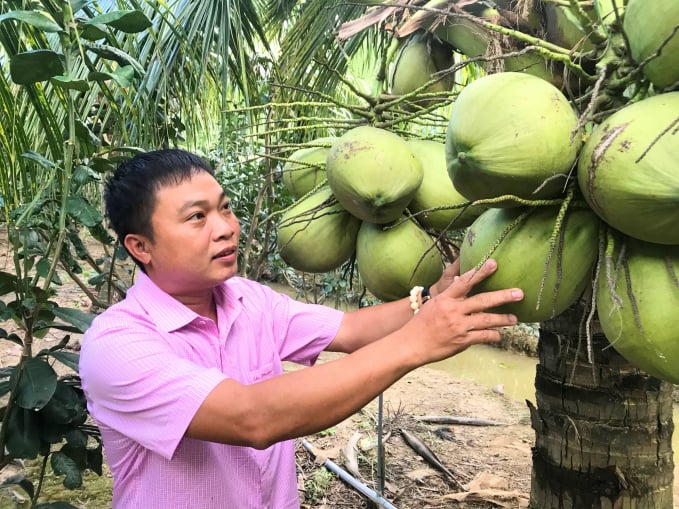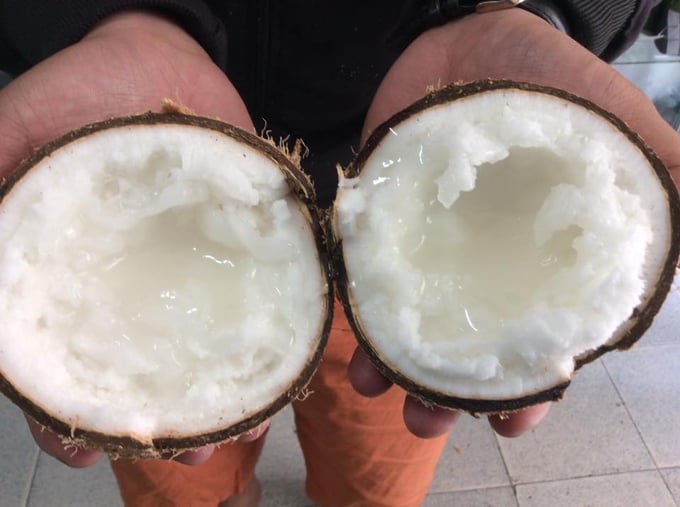November 22, 2025 | 15:33 GMT +7
November 22, 2025 | 15:33 GMT +7
Hotline: 0913.378.918
November 22, 2025 | 15:33 GMT +7
Hotline: 0913.378.918
In recent years, Tra Vinh has identified coconuts as a key crop, ranking second in terms of economic value after maize, according to Mr. Le Van Dong, Deputy Director of the Tra Vinh Department of Agriculture and Rural Development (DARD).
The province will have a total coconut cultivation area of 28,000 hectares by the end of 2024, which is the second largest in the region and the country, after Ben Tre. This area includes nearly 6,000 hectares of organic coconut that has been certified to EU, USDA, and Chinese standards, which accounts for 20% of the total area. The province has two coconut packaging facilities that export to China, as well as 29 cultivation area codes (10 of which are for export).

Tra Vinh province currently has 28,000 hectares of coconut, of which nearly 6,000 hectares are organic coconut.
It is worth noting that Tra Vinh covers more than 1,300 hectares of wax coconut, for which the National Office of Intellectual Property has issued a geographical indication certificate. The Vietnam Coconut Association also acknowledges Tra Vinh's wax coconut as the "Vietnamese wax coconut."
At present, the majority of the wax coconut output, which is 80%, is marketed as basic materials, primarily for domestic consumption. Export and domestic consumption comprise the remaining 20%. The province is home to 16 enterprises and numerous minor production facilities.
The province intends to stabilize and expand its coconut cultivation area to more than 28,000 hectares by 2030 and more than 30,000 hectares by 2050 in the forthcoming period. This encompasses the expansion of the proportion of organic coconuts with planting area codes to exceed 50% of the cultivation area for export markets. Furthermore, attempts will be directed toward the attraction of investment and the provision of assistance to enterprises that are engaged in the development of the coconut processing industry.
As per Mr. Dong, the production, refining, and ingestion of coconuts in Tra Vinh encounter substantial obstacles, despite the favorable conditions. The majority of coconut-related enterprises in the province are modest and medium-sized, which restricts their market access capabilities, technological capacity, human resources, and management expertise.
The majority of raw materials are sold to external enterprises, which limits the ability to generate high-value-added products through deep refining and product diversification. In addition, the market for Tra Vinh's coconut products remains unstable, which leaves producers uncertain about their sources of income. Enterprises and other stakeholders in the value chain lack robust legal frameworks and have feeble linkages.
Despite the fact that Tra Vinh has the second-largest coconut cultivation area after Ben Tre, the enlargement of concentrated raw material zones is still limited. Some enterprises that have established raw material zones in the province did not coordinate with state management agencies or specialized departments in order to obtain technical support. This lack of coordination can result in challenges with certification renewal or consumption linkages, which in turn affects the coconut industry in the province.

Besides the advantages, the development of coconut production, processing and consumption in Tra Vinh still faces many difficulties.
The greatest concern for coconut plantations, particularly organic ones, is pest control, particularly in relation to the black-headed caterpillar, as chemical control measures are not feasible.
Mr. Dong proposed the necessity of investment support policies for the coconut industry in the country, as detailed in Decision No. 431, dated January 26, 2024, by the Ministry of Agriculture and Rural Development, in light of this situation. These policies would assist localities in the establishment of raw material zones, the attraction of enterprise investment, the establishment of preliminary processing and processing facilities, and the security of product consumption.
It is good for enterprises in Tra Vinh that have certified organic coconut areas to purchase the entire output at reasonable prices, which are 10-15% higher than the market price at the time, as per the signed contracts. Enterprises that are interested in expanding the production of organic coconuts in areas with export-oriented planting area codes are encouraged to promptly obtain guidance and support from the appropriate authorities and local agencies.
Currently, Tra Vinh province has 27,359 hectares of coconut, which is the second-largest crop in the country. The province's coconut production is 392,399 tons, with a yield of 16.6 tons per hectare. Eight companies and cooperatives consume 5,276 hectares of organic coconut, which accounts for 19.3% of the province's coconut area. Additionally, 20 production unit codes have been granted, with an area of 1,561 hectares and 19 domestic growing area codes and 1 export growing area code. These codes contribute to the enhancement of the quality of coconut products to meet market demand and increase the value of the province's coconut products.
Translated by Linh Linh
/2025/11/21/4309-2-153400_128.jpg)
(VAN) Green and low-emission rice is paving the way for Vietnamese rice to enter high-end markets, marking the beginning of a transformation journey toward greening and elevating the national rice brand.

(VAN) ‘Right to Win’ outlines a national action plan that shapes a new vision for Viet Nam’s agriculture in an era of renewal and global integration.

(VAN) Lam Dong’s farmed sturgeon output this year is expected to reach 2,300 tons, worth VND 450 billion, affirming the brand’s position on the market.

(VAN) A surge in Ukrainian egg exports, largely driven by soaring sales to the UK over the last few years, has notably pushed up egg prices on the domestic market.

(VAN) The price of Arabica Catimor coffee in Quang Tri is currently at VND 25,000–27,000/kg (fresh cherries), the highest level ever recorded

(VAN) 'From the coffee story, we can think deeper and further about the crop production sector - from development orientations and value-chain organization to international integration,' assessed Dr Le Quoc Doanh.
/2025/11/18/2431-0-161627_248.jpg)
(VAN) Viet Nam accounts for 43% of the world's export volume of Robusta coffee. However, the Vietnamese Robusta coffee brand has yet to gain broad recognition on the global market.